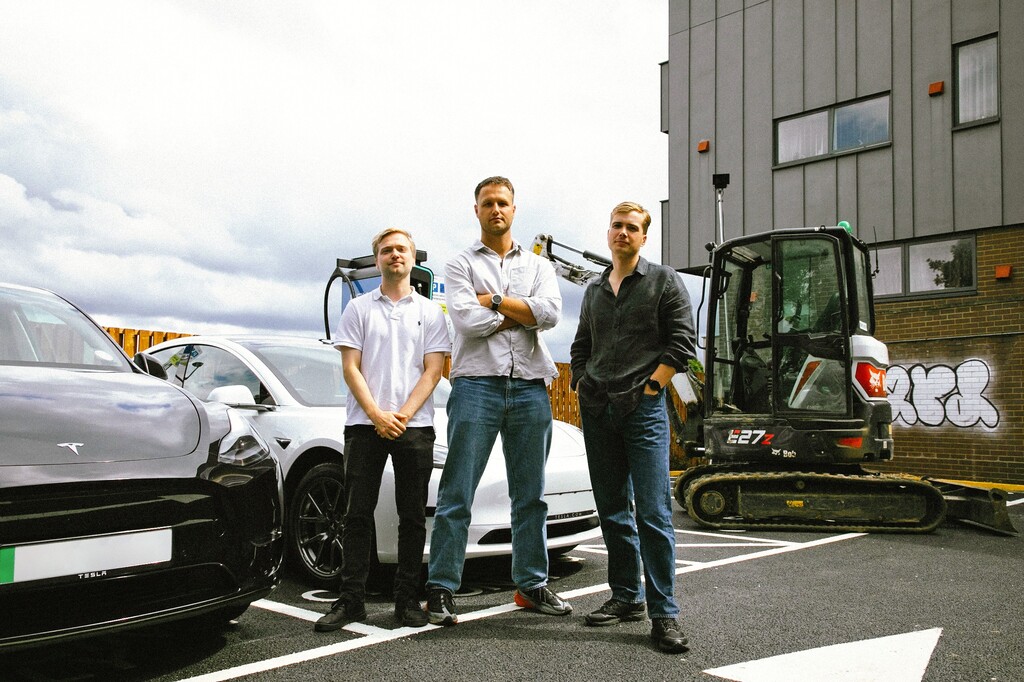
Ex-Tesla trio secure £60m to plug UK’s urban EV charging gap
Hubber, the high-powered charging platform founded in 2024 by an ex-Tesla team, has secured £60 million in committed equity to scale their acquisition and development of urban charging hubs across the UK.
The capital commitment is led by James Bayliss, former head trader at Elliott Advisors (UK), and Christopher Fox (no relation to Harry Fox), former CFO of the British Business Bank. The funding will accelerate Hubber’s growth, building on strong traction and evolving base of committed customers, enabling delivery of an initial 30 hubs.
The company’s first hub in Forest Hill, London, is set open on 20th August, in partnership with Antin owned RAW Charging.
Founded in 2024 by Harry Fox, Connor Selwood and Hugh Leckie, Hubber’s leadership team previously delivered more than 100 Tesla Supercharger sites and over 1,200 ultra-rapid charging points before the company’s Supercharger division was disbanded by Elon Musk in April 2024, laying off around 500 staff. Hubber is now applying that expertise to solve the “urban charging problem”.
Why now?
Access to fast, affordable charging in cities is falling behind the needs of drivers. Commercial fleets – from taxis and ride-hailing services to last-mile delivery vans or buses – are electrifying at pace, yet too often face a lack of appropriate charging solutions for their operational requirements.
Early ultra-rapid networks were focused along motorways to address “range anxiety”, sparking initiatives such as the £1bn Rapid Charging Fund which was scrapped by the Government in June. It’s now clear the demand gap is in cities. Here, land is scarce, costly, and faces greater challenges around grid capacity, planning, and consenting. Finding suitable plots remains a major obstacle to rollout, with even the most established Charge Point Operators struggling to make progress.
The urgency is underscored by new research from Uber. Bloomberg reported in June that, for the first time in Uber’s four years of surveys, charging access, not vehicle cost, is now drivers’ top concern, with only 27 per cent of UK drivers having access to home charging. Many of these drivers prefer to charge on-shift and want faster charging to minimise downtime.
The model
The £60m investment will fund the acquisition and development of next generation high-powered EV charging hubs across major UK cities, underpinned by megawatt-scale grid connections.
Hubber delivers modular, planning-approved, ready-to-operate sites to charge point operators and commercial fleet partners. A proprietary site-selection model, turnkey design and delivery, and trusted supply chain enable Hubber to deliver higher-quality sites, faster and more reliably than competitors – creating an institutional-grade platform in a market poised for rapid expansion.
Harry Fox, CEO of Hubber, said: “Early ultra-fast charging focused on motorways and ‘range anxiety’, but today the real pressure is in cities. The fleets doing the most miles - taxis, ride-hail, delivery vans, buses - are electrifying fast, yet city infrastructure is lagging.
"Large, high-powered hubs are the key to enabling continuous, efficient and scalable operations, but persistent delays leave a critical shortfall just as demand is surging. That’s the gap Hubber will address.”
James Bayliss, investor, said: “Urban EV charging remains one of the UK’s biggest infrastructure challenges. This uniquely skilled team now has the capital to address it, and we expect their work to make a significant and lasting impact on the country’s electrification.”
Hubber’s first project, in Lewisham, south-east London, is due to open today in partnership with Antin-backed RAW Charging.
The company was advised in the process by Tom Dugarin, director of Mireille, in his capacity as senior advisor to Hubber.
